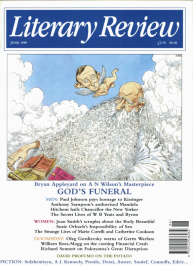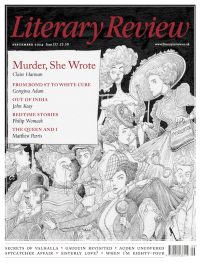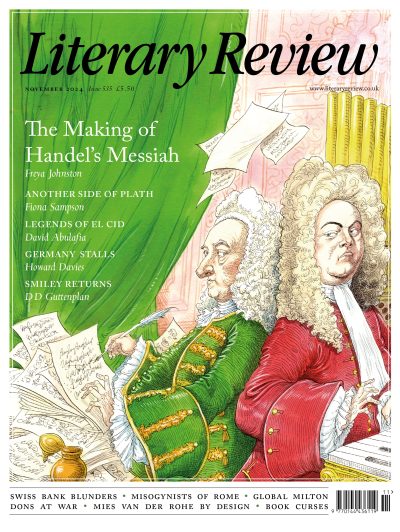November 2024, Issue 535 Freya Johnston on Handel’s Messiah * Nicholas McDowell on John Milton * Fiona Sampson on Syliva Plath * D J Taylor on Tom Sharpe * Richard Vinen on Boris Johnson * Pratinav Anil on the ruling class * Bijan Omrani on women in the ancient world * Nicholas Rankin on Oxford at war * Howard Davies on Germany’s economic miracle * Alex de Waal on Ethiopia * David Abulafia on El Cid * Altair Brandon-Salmon on Mies van der Rohe * Ian Fraser on Credit Suisse * Frances Cairncross on the care crisis * Zoe Guttenplan on Ali Smith * Stevie Davies on Andrew Miller * D D Guttenplan on Nick Harkaway * Jeremy Wikeley on Jonathan Coe * Sam Reynolds on Samantha Harvey * Eleanor Baker on book curses * and much, much more…
The Current Issue
Freya Johnston
The Making of Handel's Messiah
Does anything ever truly happen in the Messiah? This extraordinarily popular tripartite choral work, first performed in Dublin in 1742, consists almost entirely of saying rather than of doing. Circling around the redemptive power of Christ, it combines declarations with questions, prophecies, injunctions and exhortations (‘Who is this King of Glory?’, ‘Behold, I tell you a Mystery’, ‘Daughter of Sion, shout’, ‘He shall speak’). Full of urgency, tribulation and momentum, the Messiah nevertheless lacks a plot – unless we class the perennial human emotions of hope and fear, and the movement between the two, as dramatic action. The oratorio is sometimes described as a commentary, but it is a compilation of sources... read more
More Articles from this Issue
Fiona Sampson
The Collected Prose of Sylvia Plath
By Peter K Steinberg (ed)
The Collected Prose of Sylvia Plath is an essential yet strangely discomforting volume. It includes writing so apparently far removed from the work for which Plath is remembered – her late poems and her autofictional novel The Bell Jar – that it almost seems to undermine her canonical status. In reality, of course, it does no such thing... read more
David Abulafia
El Cid: The Life and Afterlife of a Medieval Mercenary
By Nora Berend
Among medieval heroes, El Cid has proved the most durable. There is no doubt that he, unlike King Arthur, existed; it is certain that he gained control of Muslim Valencia at the end of the eleventh century. Nor is there any doubt that he was a member of the Castilian lesser nobility and had a wife named Jimena... read more
Howard Davies
Kaput: The End of the German Miracle
By Wolfgang Münchau
Wolfgang Münchau has, for more than thirty years, been one of the most acute and penetrating commentators on the European Union, writing in the Financial Times, the New Statesman and elsewhere. What I mean to say by that, of course, is that I have often found him supporting my own views and prejudices in language rather more persuasive... read more
D D Guttenplan
Karla’s Choice
By Nick Harkaway
In May 1966, an aggrieved John le Carré wrote to the editor of the Soviet newspaper Literaturnaya Gazeta in response to a critical review. Noting that his books were at that point unavailable in the Soviet Union, he set out his stall for the benefit of (sadly imaginary) Russian readers: ‘I have equated, in hypothetical terms, the conduct of East and West... read more
Nicholas McDowell
What in Me is Dark: The Revolutionary Life of Paradise Lost
By Orlando Reade
While Shakespeare seems to maintain the status of perennial contemporary, Milton does not enjoy quite the same standing. The knotty theological wrangling and offensively strict gender hierarchies of Paradise Lost, not to mention the obtrusive and rebarbative personality of its author, make it an ever-harder sell... read more
Nicholas Rankin
Oxford’s War 1939–1945
By Ashley Jackson
It’s said that Oxford was spared destruction on the scale of Coventry because Adolf Hitler wanted the place as his capital after he conquered England. Ashley Jackson’s engrossing new book describes how the city of dreaming spires woke up to the realities of the Second World War. His trawl through the archives has yielded a rich and glittering haul, containing much... read more
Most Read
moreNicholas Rankin
Oxford’s War 1939–1945
By Ashley Jackson
Howard Davies
Kaput: The End of the German Miracle
By Wolfgang Münchau
Harry Mount
In Search of the English Eccentric: A Journey
By Henry Hemming
Fiona Sampson
The Collected Prose of Sylvia Plath
By Peter K Steinberg (ed)
D D Guttenplan
Karla’s Choice
By Nick Harkaway
From the Archives
moreFrom the March 2020 issue
Peter Conrad
Warhol: A Life as Art
By Blake Gopnik

From the June 1999 issue
Christopher Hitchens
Some Times in America
By Alexander Chancellor

From the June 1989 issue
Hilary Mantel
What am I Doing Here
By Bruce Chatwin

Back Issues
more
October 2024

September 2024


Sign Up to our newsletter
Receive free articles, highlights from the archive, news, details of prizes, and much more.@Lit_Review
Follow Literary Review on Twitter
Twitter Feed
Richard Flanagan's Question 7 is this year's winner of the @BGPrize.
In her review from our June issue, @rosalyster delves into Tasmania, nuclear physics, romance and Chekhov.
Rosa Lyster - Kiss of Death
Rosa Lyster: Kiss of Death - Question 7 by Richard Flanagan
literaryreview.co.uk
‘At times, Orbital feels almost like a long poem.’
@sam3reynolds on Samantha Harvey’s Orbital, the winner of this year’s @TheBookerPrizes
Sam Reynolds - Islands in the Sky
Sam Reynolds: Islands in the Sky - Orbital by Samantha Harvey
literaryreview.co.uk
Nick Harkaway, John le Carré's son, has gone back to the 1960s with a new novel featuring his father's anti-hero, George Smiley.
But is this the missing link in le Carré’s oeuvre, asks @ddguttenplan, or is there something awry?
D D Guttenplan - Smiley Redux
D D Guttenplan: Smiley Redux - Karla’s Choice by Nick Harkaway
literaryreview.co.uk